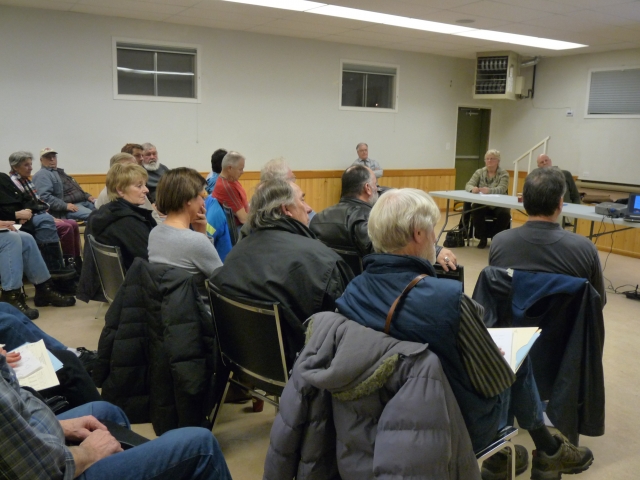Budget increases, new animal bylaws, and unsightly lands all on the table for Area D
Hot buttons for the meeting of Area D residents Monday touched off debate over unsightly premises, animal control and the Kettle River water study.
A group of over 70 people gathered at the annual meeting which gives director Irene Perepolkin and the Regional District of the Kootenay Boundary (RDKB) an opportunity to get feedback on projected budgets as well as services.
John MacLean, chief administrative officer for the RDKB, spent a lot of time reviewing various services offered in Area D (rural Grand Forks) through the district. Attendees jumped on the chance to lodge complaints on the animal control services, and the lack of remediation on unsightly premises.
Animal control is provided as a joint service with Grand Forks and Greenwood. The contract was tendered a few years ago, and MacLean said it will be re-tendered this year as a part of their normal contracting process. “I have my own wish list for the dog bylaws that I’m working on – barking, the numbers of dogs and boarding. I’ll work that into a new bylaw,” said Perepolkin.
Following up on bylaw enforcement, many questions were raised over derelict properties in the area and why there had been no action taken. Perepolkin advised that the RDKB agreed to hire a scrap metal contractor from Trail to pick up metal and cars from properties as a part of their earth day campaign in April across the region. Stuart MacKay, a local scrap metal business owner at Big Y, challenged their choice of an out of town contractor when a local business could have benefited from the work.
“We pick up vehicles, farm implements, we’ve even done it for the regional district,” said MacKay. “You seem to have lost us in the translation.”
Perepolkin replied that the staff at the RDKB had been unable to find the local business. Despite the good intentions of the project, others also doubted that the free pick up service will solve the problems.
“I don’t think a program like this makes any difference,” said resident John Vere. “People will still have this hoarder thing. It’s a great idea but we need a different approach to it.”
The biggest changes announced for the area’s budget was that Area C has withdrawn from the Boundary Economic Development Committee’s funding and the difference will be picked up by the other areas within the committee’s work. In addition, increases will be seen to the planning and development budgets. This, MacLean explained, was directly related to the lower development at the Big White ski resort.
“With the economic downturn in building inspection what we saw was a reduction in the big projects and we see a lot more little projects,” said MacLean. “When they were building $15 – 20 million projects they paid a lot of fees, and helped everybody else out. Big White is dead.”
An increase is budgeted for the Grand Forks and District Public Library (GFDPL) this fiscal as well.
“The library has been held to the same funding for a long time,” MacLean commented. “They made a proposal to the stakeholders that would allow them to improve their circulation, to improve their offer in the community. This has not been finalized, but we have included all of their ask in this number (in the budget).”
MacLean touched on the new organics waste recovery pilot project in Grand Forks and the anticipated expansion of the project to area D, not entirely welcome by all residents. The CAO was clear that there would not be an option to choose the program by individual residents once the service is initiated, but assured everyone that the cost would not be significantly increased as a result of the change in services.
With the return of director Grace McGregor as chair of the Kettle River water study, the project was announced to be moving forward and entering phase 2 of the study.
“There is a balance here quite honestly – agricultural needs vs. habitat needs vs. riparian vs. ground water re-charge vs. potable water – all of these issues are at play in the management of the river. We need to find the balance to ensure that we have long-term sustainability,” MacLean added.
New for area D in the last year is a parks and trails service. “The regional parks and trails service was just adopted last year,” MacLean explained. “Its primary focus is to be able to accept land at planned subdivisions….if we have a parks service we can take over that land.”
The region continues to offer the wood stove exchange program, headed by John Vere. The project provides assistance to access up to $750 in grants to remove inefficient, old wood stoves and replace them with alternate, environmentally friendly products. Contact Vere through the RDKB for more information on how to access the program.






















